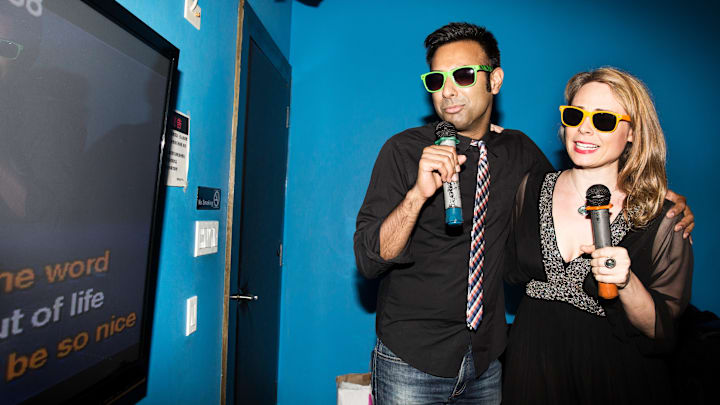Despite what you may have heard, karaoke isn’t Japanese for “tone deaf.” The word is a portmanteau of the Japanese kara, or “empty,” and oke, the shortened form of okesutora, meaning “orchestra.” But who came up with this delightful concept, anyway?
Shigeichi Negishi’s Sparko Box
Karaoke’s story begins in late 1960s Japan with a man named Shigeichi Negishi. He owned Nichiden Kogyo, which made 8-track decks, and one day, he was singing along to a radio show called “Pop Songs Without Lyrics” at the end of the work day. An engineer poked some gentle fun at his boss for singing—and Negishi had an idea. “I asked him, ‘Can we hook a microphone up to one of these tapedecks so I can hear myself singing over a recording of Pop Songs Without Lyrics?’” Negishi recalled in 2020. “‘Piece of cake, boss,’ he told me.” A machine was on his desk just three days later. Negishi took the device, which he called “the Sparko Box,” home to his family and knew he had a hit on his hands.
At that time, the word karaoke was already in use—it was an industry term for the backing tapes that performers would sing along to when they couldn’t bring a full band or orchestra. Negishi sought out a distributor for his machine (who, the inventor said, “wouldn’t let me call it a karaoke machine! Said karaoke sounded too much like kanoke,” meaning “coffin”), which was accompanied by lyric booklets.
Unfortunately, the bar-hopping guitarists who had dominated the sing-along scene, nagashi, put an end to the enterprise. Bar owners, Negishi said, would “tell us that their patrons couldn’t get enough, and that we should never come back. It was the nagashi! They were complaining. Everywhere we put the box, they’d force the owners to take it away.” Negishi never patented his invention.
Enter Daisuke Inoue
In 1971, musician Daisuke Inoue invented his own karaoke machines independently. At the time, he was living in Kobe and playing drums in a band that would accompany bar patrons when they wanted to sing. He told a reporter for The Guardian that he was a terrible musician, so he created a machine to play for him when he didn’t want to (or couldn’t). He had 11 machines constructed and leased them to local businesses.
The machines were a success, and soon, other companies began to make them. By the ’80s, karaoke was all over Japan. According to Forbes, America’s first karaoke bar opened in Los Angeles in 1982. By 2003—the first year of the Karaoke World Championships, which had participants from seven countries—karaoke had become a worldwide phenomenon.
Like Negishi, Inoue never patented his karaoke machine, and, according to NPR, he earned almost no money from his invention. “I could have patented it but at the time I didn’t have any idea,” he told The Guardian. “I just wanted to help some local artists in a local band so they could do some business.” (A Filipino man named Roberto del Rosario patented the Karaoke Sing Along System in 1975.) But what Inoue lacks in wealth, he’s made up in glory: In 1999, TIME named him one of the most influential Asian people of the century, and in 2004, he received the Ig Nobel Peace Prize, for providing—in the words of master of ceremonies Marc Abrahams—“an entirely new way for people to learn to tolerate each other.”
In his acceptance speech, Inoue said that “One time I had a dream to teach people to sing, so I invented karaoke. I didn’t know it would be the start of something big. Now more than ever, I want to teach the world to sing, in perfect harmony.” He received, per The Guardian, the longest standing ovation the Ig Nobels had ever seen.
Discover More Answers to Big Questions:
